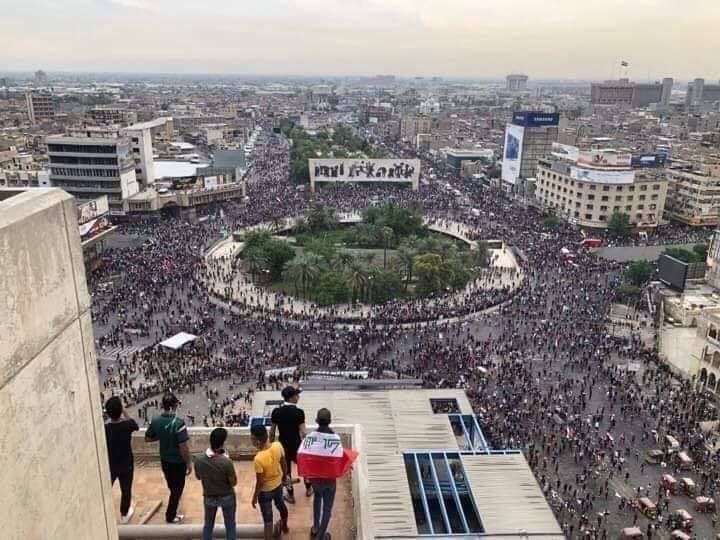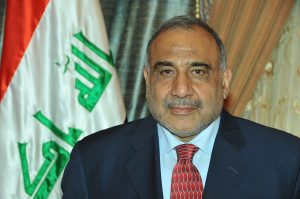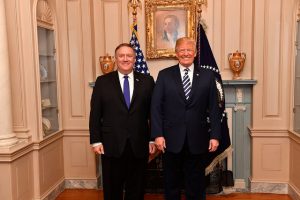By Paul R. Pillar
Recent disturbances in Arab countries have not yet become as far-reaching as what ensued after a Tunisian fruit vendor immolated himself in protest nine years ago, but observers are already talking about an Arab Spring 2.0. Extensive unrest has materialized in the streets of Iraq and Lebanon, along with less salient protests in Algeria, Sudan, and elsewhere. Two striking aspects of the current protests stand out and are relevant to Western policies toward the region.
One is that the sources of discontent are primarily old, familiar ones that also underlay the first Arab Spring. They involve the basic human desire for a better life. Simply put, the target of the discontent is the inability of existing political systems to deliver services and economic opportunity in a fair, uncorrupt, and effective way.
This source of unhappiness is shared by many people from different communities and with different political affinities. The unrest is not defined mainly in terms of specific ideologies or even religious and ethnic identities. The Arab journalist Mina Al-Oraibi observes that some of the unrest in Iraq “highlights how Shiite-majority provinces haven’t benefited from political parties using ‘Shiite identity’ to gain and retain power.”
Understanding of the roots of the unrest is to be found not in any party’s manifesto but instead in the social and economic shortcomings analyzed in the series of United Nations-sponsored studies, the first of which was published in 2002, issued under the name of the Arab Human Development Report.
The other major attribute of Arab Spring 2.0 is that it differs from common U.S. perceptions of troubles in the Middle East. One dominant theme in those perceptions, promoted by the neoconservatives whose control of policy in the George W. Bush administration culminated in the Iraq War, has been democracy and the concept of Middle Easterners yearning to be free of authoritarian rulers. Many Iraqis surely were happy to be free of such rule, but in the short term any gratitude for help in shedding such a yoke was outweighed by resentment over foreign occupation—a sentiment that has influenced Iraqi policies ever since. The U.S. occupiers were met less with flowers and sweets than with insurgency.
Over the longer term, the inability of the U.S.-shaped Iraqi government to deliver corruption-free services and opportunities has dominated popular sentiment and underlies the current unrest. There are some parallels with post-Soviet Russia, where any early happiness about shedding the Soviet system became overshadowed by unhappiness over corruption and inadequate public services, leading some to mourn the passing of that system.
More recently the dominant U.S. tendency has been to look at Middle Eastern countries as squares on a chessboard on which the United States competes for influence with rival powers from outside the region, especially Russia, or inside it, especially Iran. The latter rival, along with the notion of an Iran-controlled “Shia crescent,” especially serves as the present U.S. administration’s all-purpose explanation for any trouble in the Middle East. But Middle Easterners do not think of themselves as squares on someone else’s chessboard, and the current disturbances show that they don’t.
The unrest in Lebanon is less a confrontation of one confessional community against another or one sectarian-identified group against another than it is a widespread rejection of the entire system of confessional politics. That system has rested on confessional-based patronage that has made for a rigid and unresponsive polity and ineffectiveness in meeting many needs of Lebanese and Lebanon as a whole.
Something similar is occurring in Iraq. Protestors’ chants have included anti-Iran slogans, but that does not reflect any desire for a new Iraqi-Iranian confrontation. Instead, it reflects how Iran is the foreign entity that has become most visibly associated with a disdained domestic status quo. As Alissa Rubin describes the situation in the New York Times, “It is a struggle, above all, between those who have profited handsomely since the American invasion toppled Saddam Hussein and those who are struggling to get by and look on with fury as the political parties, some with ties to Iran, distribute payoffs to the well connected.” Iran is not getting many flowers and sweets these days, regardless of Iraqi gratitude for what it did to help defeat Islamic State in Iraq.
A couple of policy implications for the United States follow. One is that if an objective is to make Middle Eastern countries more peaceful and stable, pay most attention to the human development needs of its people. Forget the chessboard.
Another is that if you want to have more of a presence in these countries than rivals such as Russia or Iran do, be careful what you wish for. Anti-occupation sentiment will be strong, even to the point of trumping dissatisfaction over the inability of local authorities to meet human needs. That is why, as Aaron David Miller explains, the new Arab Spring has not spread to Palestine, despite the ineffectiveness of the Palestine Authority. Palestinians realize that the biggest and most oppressive fact in their lives is the Israeli occupation, and most Palestinians save most of their anger for that target.
Beyond resentment of anything perceived as foreign occupation, an ineffective and despised domestic economic and political power structure causes resentment against any foreign power that, for whatever reason, comes to be associated with that structure. Iran’s position in Iraq illustrates that point vividly, and not just because of Tehran’s own missteps.
Despite all the alarm expressed in American rhetoric about Iranian influence in places such as Iraq, that influence—beyond securing Tehran’s basic security objective of not having another Iraqi dictator launch an invasion of Iran, as Saddam did in 1980—has not bought Iran much beyond a lot of unfriendly slogans chanted by unhappy Iraqis.






The vacuum of Middle East government has been no alternatives to the autocracy (whether tribal, royal or military) that a robust civil society would enable popular, mass political systems to flourish. Except the Mosque. On every corner in every village in every province. And with influential preachers accessing almost all with the same basic theme/message. The first Egyptian election showed such a divided, leaderless, disorganized social/political system at the mercy of the vast, highly organized, dedicated religious structure.
Unless and until the autocracies, whether military (Egypt) religious (Iran) or tribal (Saudi Arabia) allow social groups such as political parties, trade associations, non-profit charities and all the rest a diverse society engages, the Middle East will continue to experience violence and civil discontent. Hold your breath?
With all my respects, I find this article full of nonsense and contradictions. When you ,usa ,stop interfering in the domestic affairs of other countries, the world will be better.
I salute you from Algeria, here the spring is not Arab.
Sincerely yours.
Efraim Shalom
Arabs are too immature to understand or to operate the machinary of Democracy as is understood in France or in the United States.
The best that has been achieved by any Muslim country, has been Turkey and Iran – both non-Arab countries.
And, there was more Liberty in Spain under Franco than has ever existed so far in Turkey or in Iran.
That is because the idea of Freedom is alien to Islam and Muslim culture: every one is a Slave of Allah and must obey His Commandments, as interpreted & instructed by their religious leaders.
And since Muslims claim that Islam has a stipulation or rule for all aspects of life (that is a false claim & belief but if you dispute it, in many Muslim countries you would likely be murdered.), it follows then that there really cannot be any Freedom in Islam or in a Muslim society; that Tyranny is the best form of government for Muslims to keep the Slave of Allah to behave as slaves.
This problematic has not been adequately discussed by Muslims and without such a discussion and reaching of a consensus on the extent and limit of the concept of Liberty in Islam, such things as Civil Society or Personal Freedom shall remain ephemeral and utopian.